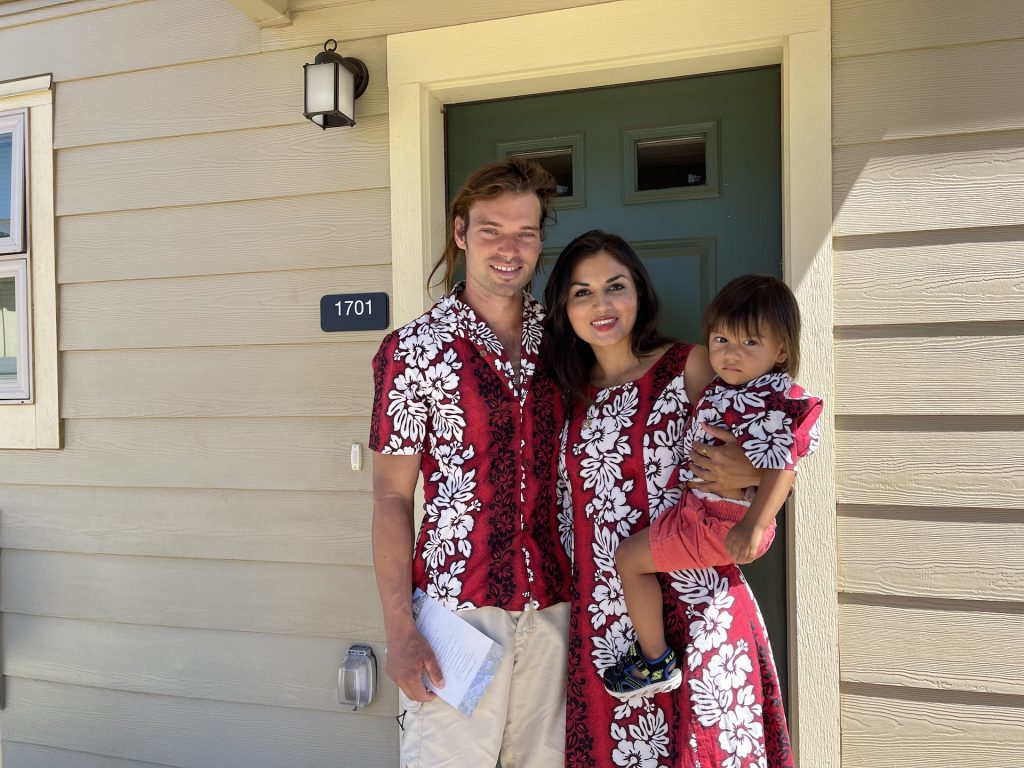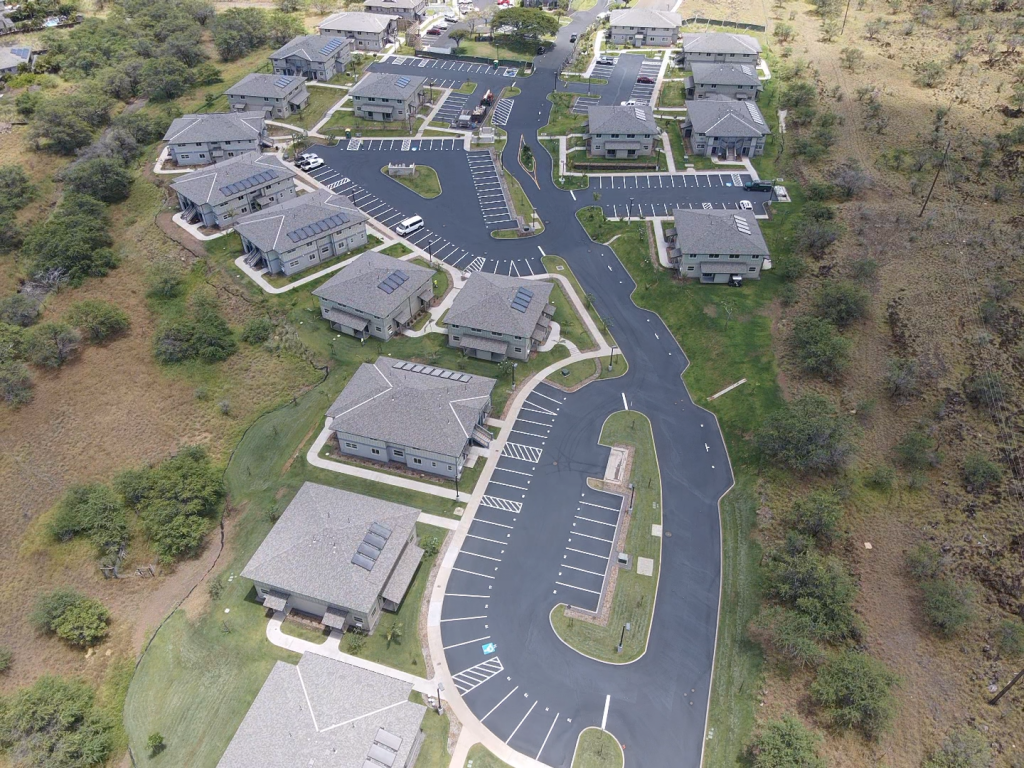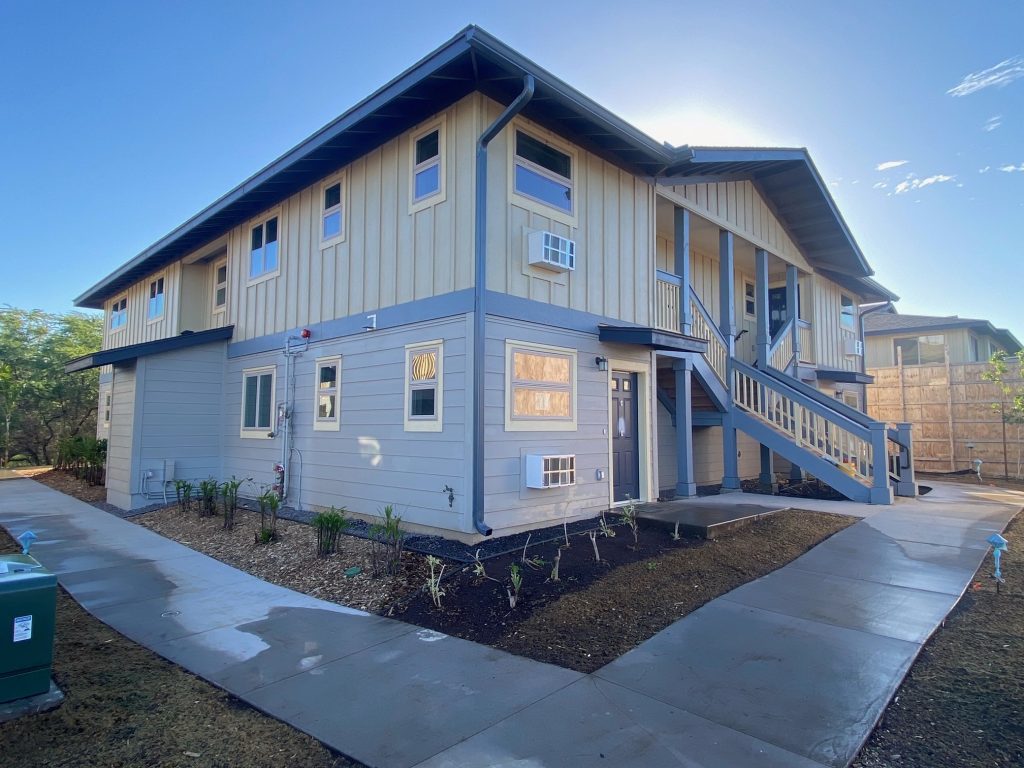New Big Island affordable housing development dedicated in Waikōloa

For the past four years, Jessica and Dylan Ward were spending $1,500 a month to rent a room in a house they shared with five other people in the North Hawaiʻi town of Kawaihae. Privacy and comfort got increasingly difficult with the birth of their son Cedric in 2021.
When applications opened for the Waikōloa Family Affordable Housing Development, the Wards applied right away.
Now, as some of the first residents to occupy the complex, the Wards were invited to attend Wednesday’s dedication and blessing of the Big Island’s latest affordable housing development
In the parking lot under big white tents, officials with the nonprofit developer Coalition for Specialized Housing, and state and county leaders joined in the celebration of the new 110-unit complex, comprised of 39 one-bedroom units, 40 two-bedroom flats and 31 two-bedroom townhouses.
The units are housed in eight two-story buildings with four units each and 10 two-story buildings with eight units each.
“As we all know, with the cost of living there is a tremendous and urgent need for affordable housing for our families and kūpuna,” said Jeffrey Emerson, president of Coalition for Specialized Housing.
Emerson said this is the first project the coalition has completed on the Big Island. The development is at 30% occupancy; and they expect it will be fully occupied by the end of the year. To apply for a spot in the housing complex, click here.
To qualify to live in the $46 million development, a family or individual must have an annual income of 60% or less than the area median income.

During the ceremony, Hawaiʻi Gov. Josh Green’s chief-of-staff Brooke Wilson said in the last two months, 695 new units, including the new Waikōloa development, have broken ground around the state. Green has a goal of 10,000 affordable units in his first four years in office.
Wilson thanked the people who will be living in the new complex.
“You guys are going to set the tone for this community,” she said. “Without people, it’s just buildings. I can see in all of your faces you’re going to take care of this place and make it a safe place for you and your families. Because that’s what community building is about.”
Five percent of the units cost $400 per month to rent for the people with the lowest income. For residents with an income at 60% of the area median income, monthly rent starts at $950 for a one-bedroom unit. A two-bedroom unit costs $1,058 a month and a two-bedroom townhome costs $1,108 a month.
The rent covers sewer, water and homeowner association fees. Renters pay for electricity.
Dylan Ward is excited about the onsite trash and Jessica Ward is excited about mail delivery.
“It seems normal to have those things, but it was stuff we never had,” Dylan Ward said.
Each unit includes air conditioning, solar water heater, storage area, parking stall and energy-efficient appliances, including a refrigerator and range/oven. For amenities, there is the use of the area community center, swimming pool and golf course.
Affordable housing developments are needed more than ever in Hawaiʻi, with the median price of a single-family home now at $850,000, nearly three times the national average. The median cost of a condominium is $600,000 – a price that’s tripled since the 1990s.
An annual income of $252,000 is needed to afford a new median-priced home in Hawai‘i. Fewer than one in three households can afford a single-family home, and fewer than one in two can afford a condo.
The coalition bought the land from Castle & Cooke in 2017 with the intention of developing the area for affordable housing. The coalition with partner GSP developed the complex. The company Locations will manage it.
Financing for the project came from the state Hawaiʻi Housing Finance and Development Corp., First Hawaiian Bank, HHF and the Coalition for Specialized Housing. Government assistance came via Low-Income Housing Tax Credits, Rental Housing Revolving Fund allocation, and Hula Mae Multi-Family tax-exempt bonds.
The Waikōloa project will stay affordable for 61 years.
“It’s a challenge for other developers to try and do the same,” Wilson said. “Thank you for raising the bar.”
Sponsored Content
Comments











_1770333123096.webp)


